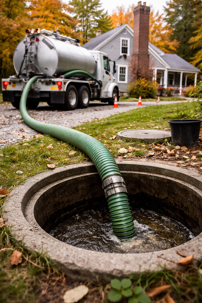In most cases, you should schedule a septic tank pumping every 2-3 years.
Going more than 5 years between pumpings is strongly discouraged. Doing so can damage your drain/leach field, which is very expensive to replace.
This is a reliable general guideline. When you schedule pumping with Wind River Environmental, our certified technicians keep you updated with reminder messages before and after the pumping. We also provide a report and tailored recommendations.
What Factors Influence Septic Tank Pumping Frequency?
Several factors affect how often you need to pump your septic tank. Even if your system typically requires service every 2 years, you may occasionally need to pump more frequently.
The factors that could affect your pumping frequency include:
- Number of People in Your Home – Household occupancy is one of the biggest contributors to how quickly your tank fills. The more people living in – or regularly visiting – your home, the more wastewater your septic system must process.
- Age and Condition of the Septic System – Older or less efficient systems may require more frequent pumping to prevent backups or system failure.
- Size of the Septic Tank – Smaller tanks fill faster and require more frequent service.
- Seasonal Usage Changes – Vacation homes, rentals, or homes with fluctuating occupancy levels may need a different pumping schedule.
- Use of Additives – Even with septic additives, bacteria cannot fully break down all solids. Routine pumping is essential.
Special Considerations: Garbage Disposals & High Water Usage
The chart above assumes you do not use a garbage disposal. Garbage disposals can increase the amount of solids entering the septic tank by up to 50%, requiring more frequent pumping.
You may also need to pump more often if you frequently do:
- Heavy loads of laundry.
- Large gatherings.
- High water usage activities.
Any increase in wastewater flow may shorten your pumping interval.
Why Regular Septic Tank Pumping Is Essential
You already have a lot to think about – your septic system shouldn’t be another stressor. But letting too much time pass between pumpings can cause serious and expensive problems.
Think of pumping your septic tank like changing the oil in your car: it is a critical part of preventative maintenance.
Here’s why:
- When wastewater enters the septic tank, it separates sludge, scum, and effluent.
- Solids sink to form a sludge layer, while oils and floating materials form the scum layer.
- Only the liquid effluent should exit to the drain field.
Even with healthy levels of bacteria, solids accumulate over time and must be removed.
What Happens If You Don’t Pump Your Septic Tank?
If septic tank pumping is neglected:
- Sludge and scum can clog the inlet line, causing raw sewage to back up into your home.
- Solids can enter your drain field and clog it, potentially destroying it.
- Drain field repairs or replacements can cost tens of thousands of dollars.
- Your family’s health may be at risk from wastewater exposure.
A well-maintained septic system can last 25-30 years or longer. Routine pumping is the most cost-effective way to prevent system failure and protect your property.
Trust the Experts at Wind River Environmental
No matter who you choose, regular septic tank pumping is essential to the health, longevity, and safety of your septic system.
Our certified technicians keep you updated with reminder messages before and after pumping, and they provide a report and any recommendations.
For more information about the care and pumping needs of your septic system, contact us today!





